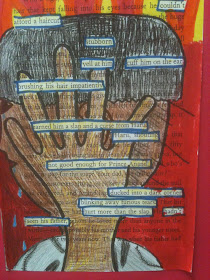Friday, October 30, 2015
Redacted Poems
Your kiddos did a great job analyzing mood and tone in their novels. Here are some superb examples of the redacted poems that they created from pages of their novels.
Wednesday, October 28, 2015
Redacted Poetry to Analyze Mood and Tone
Students are working on a cool project tomorrow. They chose a section of their reading group novel they would like me to copy for them. Tomorrow, they will use these sections of text to create a redacted poem: where they select certain words, phrases, or sentences to create a poem that mirrors the mood of their novel. This is a graded assignment, and you can see the rubric here.
See some examples below, and make sure to come back; I will post our own creations here when we finish!




See some examples below, and make sure to come back; I will post our own creations here when we finish!




Tuesday, October 13, 2015
Upcoming Standards Focus
We have been working steadily on practicing for upcoming assessments!
We are using our reading groups to discuss how the author is introducing the main character in our novels. Last Thursday 10/8, students practiced this discussion in their reading groups. This Thursday 10/15, they will use the same format to be assessed on these standards:
RL6.3 Students will be able to describe how a particular story's plot unfolds as well as how the character respond or change.
RL6.1 Students will be able to cite textual evidence to support analysis of what the text says explicitly as well as inferences drawn from the text.
In addition to the group discussion assessment, students have been being continuously monitored for their preparation for reading groups to achieve proficiency at these standards:
SL6.1a Students will come to discussions prepared, having read or studied required material; explicitly draw on that preparation by referring to evidence on the topic, text, or issue to probe and reflect on ideas under discussion.
SL6.1b Students will be able to follow rules for collegial discussions, set specific goals and deadlines, and define individual roles as needed.
We are also using nonfiction text articles to explore what techniques authors use to introduce key ideas in nonfiction text. Students have learned 7 different techniques that authors commonly use and have been hard at work practicing how to identify them and analyze how it helps them understand the text. Working with nonfiction is very different than working with fiction and requires a different type of practice for what seems like a similar skill. Next Thursday 10/22, they will be assessed on these standards:
RI6.3 Students will be able to use key ideas to analyze in detail how an individual, event, or idea is introduced, illustrated, and elaborated in a nonfiction text.
RI6.3 Students will be able to cite textual evidence to support analysis of nonfiction text.
Students have had plenty of practice time in class for all of these skills.
Thursday, October 1, 2015
Reading Group Novels
Today, your child should be coming home with a reading group novel that we will be using daily for our second unit: Authors as Mentors, and our current concept: Perception.
Students self-selected these novels in class based on interest, Lexile level, and readability for their current reading level. Additionally, students met with their reading groups to set weekly reading goals and expectations.
Some expectations include, but are not limited to:
- nightly reading of novel (ONLY IF daily goal is not met in class)
- achieving the weekly reading goal set by the group; but NOT reading beyond
- reading with their notebook next to them to jot down thuoghts, quotes, and interesting parts to discuss at with the group at the next meeting
- using thinkmarks (teaching in class on Friday) and sticky notes to mark interesting pages to discuss
- selecting evidence from the text to support thinking
- thoughtfully and respectfully agreeing/disagreeing with other members of the group
- being an active member of the group by listening and adding to the conversation when possible
- being an independent, responsible member of the group to ultimately make the group function as a whole
Following these expectations is necessary for success on assessment grades that will be taken through discussion groups (both participation AND preparation will be assessed) and constructed responses that require the student to analyze the author's craft. Please see the What Are We Studying? tab for the rubrics and standards being assessed in this unit.
Here is a video of what a successful reading group should look like:
Watch a Small Group Conversation to See Students Tracing a Theme Across and Within Bud, Not Buddy and Tiger Rising (3-5) from TC Reading and Writing Project on Vimeo.
Subscribe to:
Posts (Atom)